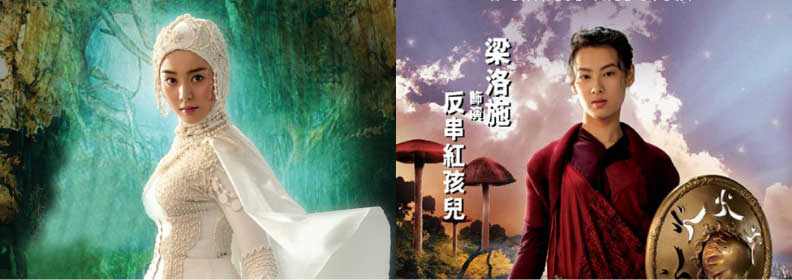A Chinese Tall Story
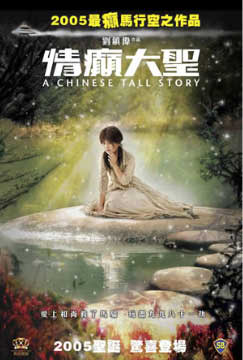
Film review by Lee Alon
Flattering comparisons have been made between
this holiday 2005 special effects bundle and Steven Chow's seminal Journey
to the West rendition of the Monkey King legend, a film now over ten years
old. While some similarity does come to pass, the awkwardly-titled newer film
has more to do with stuff from the first half of this decade, namely goofball
comedies like The Lion Roars and Himalaya Singh. And when we tell you that
Tall Story's not even as accomplished as those, that should be enough to
seal its fate and consign the thing to that dubious realm of half-baked movie
projects hovering somewhere between the recycle and bargain bins.
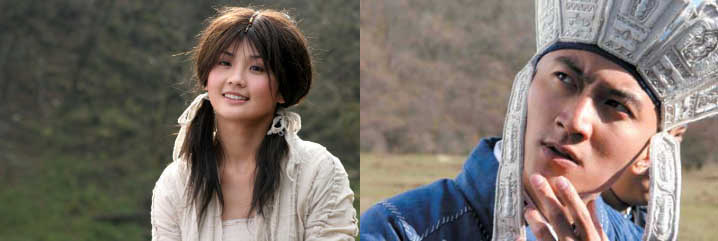
Not wanting to be harsh, really, but how can we possibly gloss over a meager
story that's clearly never intended to become anything remotely attractive,
instead playing distant runner-up to visual stimulants that, quite frankly,
not only seem like true lifts out of Tsui Hark's Legend of Zu (2001), but
also add nothing to the pantheon of video bonanzas when considering much
older fare, to wit Storm Riders (yes, some eight years ago if memory serves
us right). Indeed, Tall Story compiles various components in a feeble attempt
to sway audiences, but sadly possesses nary a bona fide element worthy of
acclaim, save perhaps for the surprising amount of gore evident throughout.
Considering its kid-friendly rating, one must surely feel satisfied with
the producers' decision to go ahead and include several instances of such
sheer carnage.
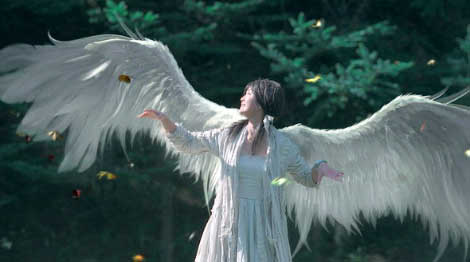
The main issue with Jeff Lau's latest project is that, unlike his own heartfelt
but humorous Chinese Odyssey 2002, Tall Story plays out a connect-the-dots
scenario, thus leaving folks with almost no tangible merits to cling on to.
And with its focus on effects not coming up roses due to their rather formulaic
execution, the movie perhaps could have hoped for increased reliance on a
strong cast. Alas, it has none.
Nicholas Tse flies in from leftfield in his second
release of the season, hot on the heels of also-ran, likewise-failed The
Promise. Here reformed rebel Tse plays naughty Buddhist monk Tripitaka, on
a pilgrimage to the hallowed city Shache, which turns out to be yet another
stereotypical portrayal of what moviegoers in China today are supposed to
expect India to look like. Thus, the place comes nestled around some hills
and you get people dancing in the streets to the merry tune of off-screen
snake tamers. Whoa, as Neo would probably have quipped. Tirpitaka's in town
with his apostles, or hangers-on, questing to obtain ancient knowledge on
their way to nirvana. The three stooges accompanying him (Steven Cheung, Chen
Bo Lin and Kenny Kwan) could have passed for the Monkey King's posse were
they actually good for anything, but as the picture stands all receive very
little play and produce next to no effect.

Later monk and holy city come under attack from nefarious evil forces known
as the Tree Spirits, although they don't mind being called Insomnia, because
that's the baddie from Legend of Zu, their obvious source of "inspiration".
At least these mean, ugly bastards look passable on screen, more than can
be said for much of the film's video contingent. Literally shot out of harm's
way, Tripitaka falls into the custody of a deviant clan of reprobate imps,
especially assigned caretaker Meiyan, who's under orders from her mom to
eat the pilgrim for his fountain of youth-like flesh. Meiyan's cavewoman
visage should be enough to send anyone packing, and we're meant to observe
her as the embodiment of everything repulsive (played by Charlene Choi of
Twins, and hey, we're not saying anything). Naturally, as the would-be plot
progresses, that turns out to be quite misleading. Mostly, the bulk of this
story revolves around Tripitaka and the nasty, devilish imps as they try
to subvert him away from righteousness. This leads to numerous gags and routines
that truly arrive at scant funny conclusions. Even likable Isabella Leung
(Bug Me Not) makes no difference at all.
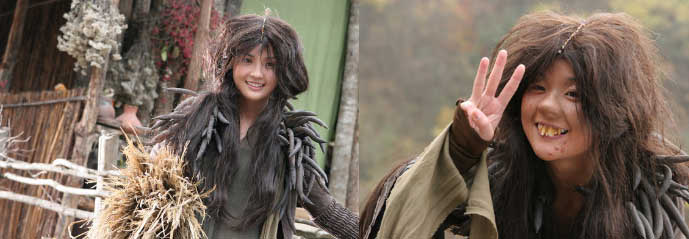
Other influences on the story include a spacefaring, aristocratic beauty
(Fan Bingbing) who returns to earth in order to combat the overzealous Tree
Spirits with her armada of googley-eyed Ultraman clones. Again, these guys
do look OK, and also serve to garnish Tall Story with its much-vaunted SF
categorization, something most genre-purists, understandably enough, have
been balking (and hurling) at. Additionally, we witness one slightly courageous
scene where Tripitaka, a prettified Meiyan (now looking like Charlene Choi
minus the heavy makeup, and hey, we're still not saying anything) plus everyone
else takes on the Yellow Emperor himself. On the off-chance Lau wants us
to deem it as some sort of sly political comment, well, all the more power
to him, but it remains highly doubtful.

That about sums up the extent of A Chinese Tall Story, and here's hoping
the next one soars taller. It's too bad the last big HK release of the year
doesn't deliver on its promises of action, laughs, frights and CG superlatives.
With a bland, often dragging storyline, characters that don't really go anywhere
and sights of a distinctly average persuasion, we can't honestly issue a
recommendation, and it doesn’t matter if the folks involved in this project
wanted it to come out right and gave their best.
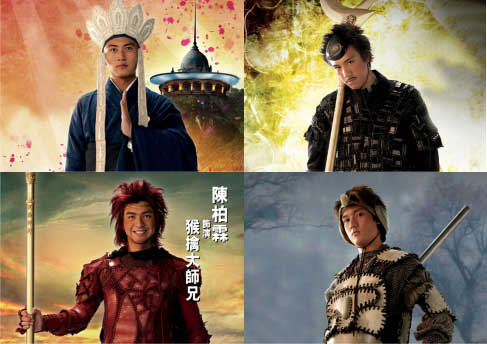
And shouldn't it have been a tall tale, anyway?
Rating: 5/10
Directed by Jeff Lau
Starring Nicholas Tse, Charlene Choi, Fan Bingbing,
Kenny Kwan, Steve Cheung, Chen Bo Lin
2005, Cantonese, 103 minutes
Contact Lee Alon here
